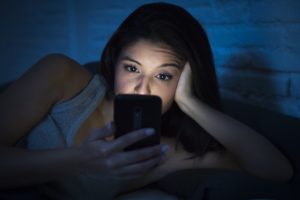 We’ve all done it at one point. As a way to help wind down after a long day, we pacify ourselves and relax in front of an electronic device. Whether it be a smart phone, laptop or big screen television, it can be hard to shut down. However, many people don’t realize that the blue light that emits from electronic devices can seriously disturb your sleep cycle. Of course, this is just one reason why you should keep your electronics out of the bedroom. Consider these three reasons why device use before bed is harmful based on sleep science.
We’ve all done it at one point. As a way to help wind down after a long day, we pacify ourselves and relax in front of an electronic device. Whether it be a smart phone, laptop or big screen television, it can be hard to shut down. However, many people don’t realize that the blue light that emits from electronic devices can seriously disturb your sleep cycle. Of course, this is just one reason why you should keep your electronics out of the bedroom. Consider these three reasons why device use before bed is harmful based on sleep science.
Melatonin Suppression
Melatonin is a hormone produced by the pineal gland that regulates wakefulness. If your melatonin levels are not properly regulated, it can significantly reduce your ability to stay asleep or get to sleep effectively. This is because melatonin also controls your sleep/wake cycle, also known as your circadian rhythm. The lower your melatonin levels are, the more difficulty you’re going to have getting to sleep.
Most devices, whether they be phones, tablets, computers or television screens, emit a blue light. This light is intended to make viewing your screen easier, but it can dramatically affect your ability to get proper sleep. To combat this, make sure to remove all devices from your bedroom at least 30 minutes before you go to sleep. This transition away from devices will make staying asleep much easier.
Brain Activity
It’s no secret that your devices can be incredibly addictive. What may seem harmless, (i.e. using social media or checking work emails) can actually be a big contributor to your brain activity. Furthermore, activities like this can actually make you less productive the following day. According to a 2014 study from Michigan State, people who used their smartphones for work purposes after 9 p.m. reported being more tired and less focused the following day. Instead, stick to activities that help you relax but don’t keep you awake as easily. If reading a book or dimly-lit e-reader helps you fall asleep, then go for it.
Close Proximity
Most people use their phones as their alarms these days, so the days of the nightstand alarm clock are surely numbered. But that doesn’t mean you should rely on your phone as your alarm. Your phone can still make noises that chime throughout the night, which can be disturbing if you’re a light sleeper. This is becoming a bigger issue with children who may struggle to discontinue the use of their phones before bed. According to a study from the National Sleep Foundation, 72 percent of children and 89 percent of older teens (ages 15-17) have at least one device in their bedroom. In that same study, sleep quality and duration both suffered for those who kept their devices occasionally on while in the room.
To show your children how important it is that they limit their phone use, lead by example. Purchase an alarm clock they can use themselves so they don’t have to rely on their phones to wake up.
Are you struggling to get to sleep at night but aren’t sure why? It may be worth scheduling an appointment with a sleep doctor. Learn more helpful habits or get your sleep issue diagnosed today!
About the Author
Dr. Shelley D. Shults is a board-certified nurse practitioner, general dentist, and dental sleep medicine practitioner. She’s also a diplomate of The American Academy of Dental Sleep Medicine. With her expertise, she can help you and your family achieve a better night’s sleep. To learn more about her practice, you can contact her through her website.
